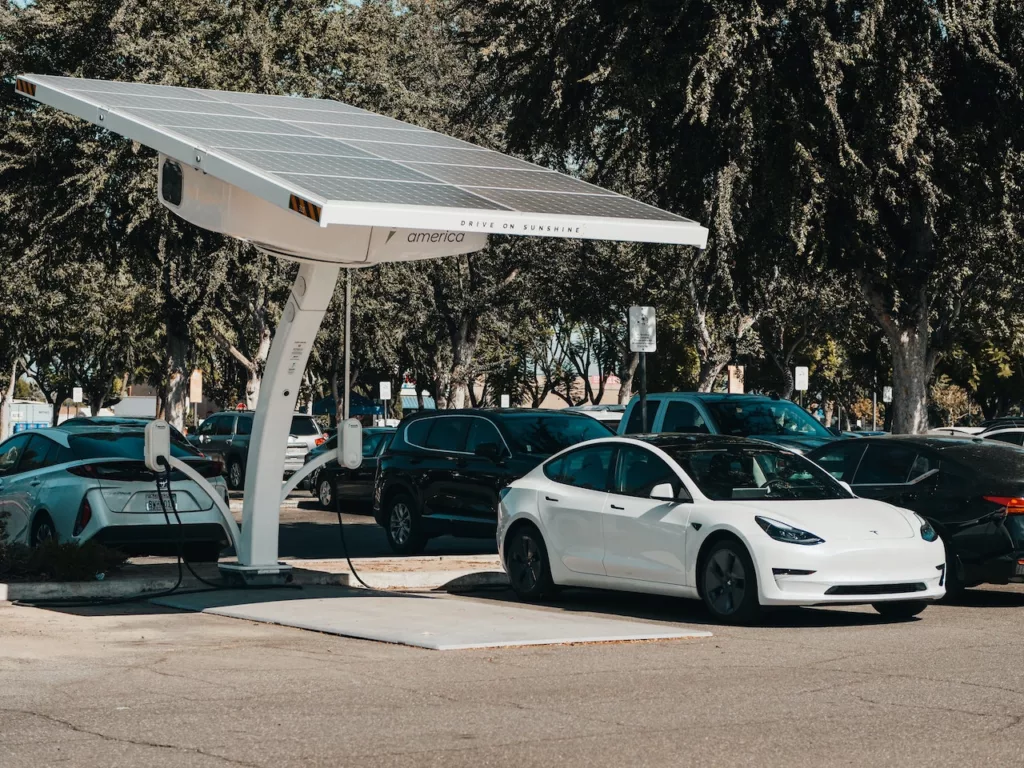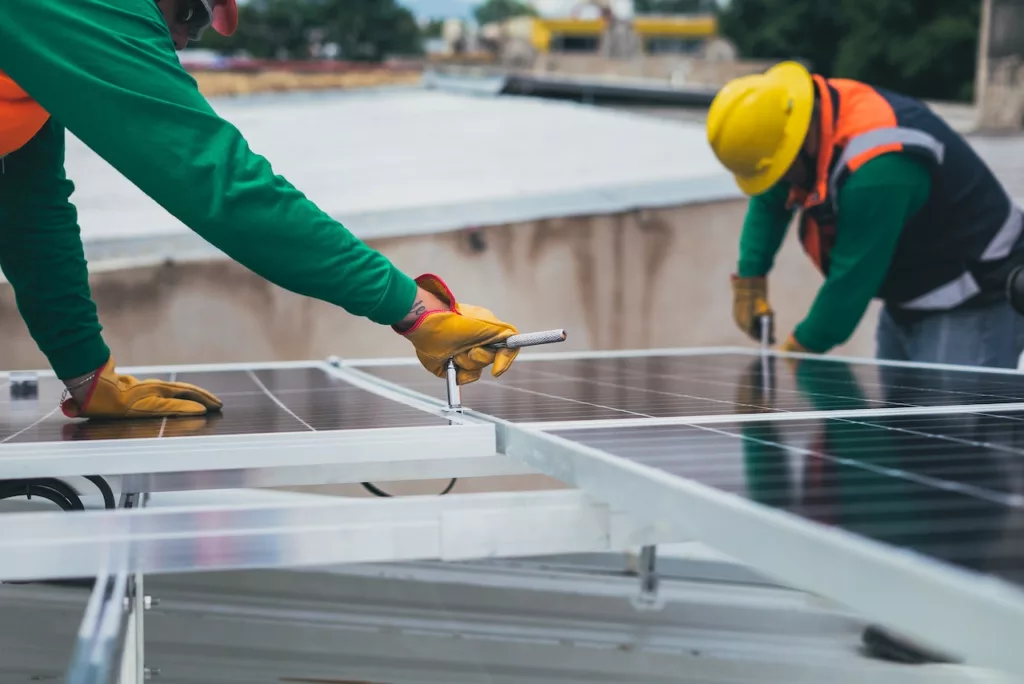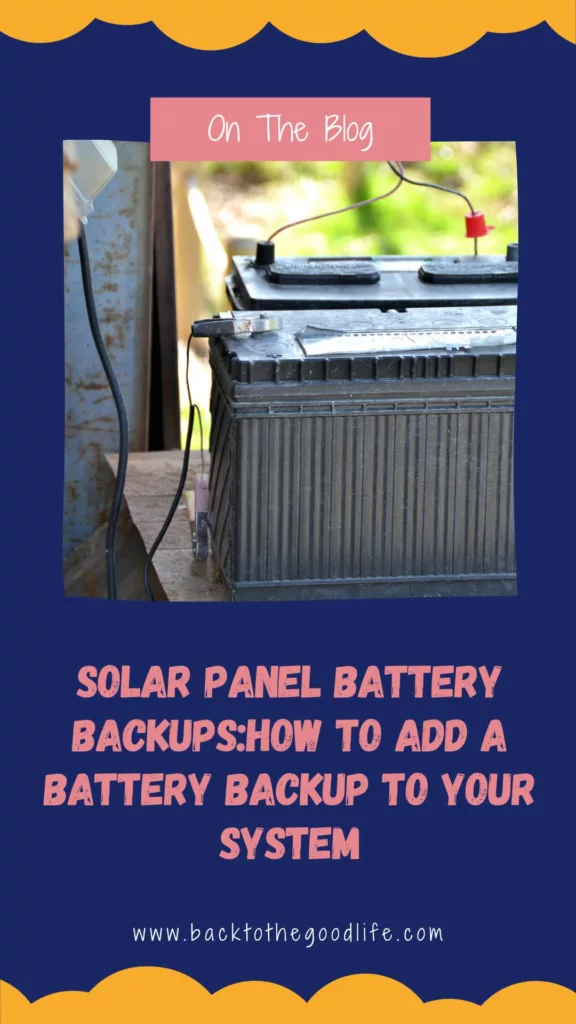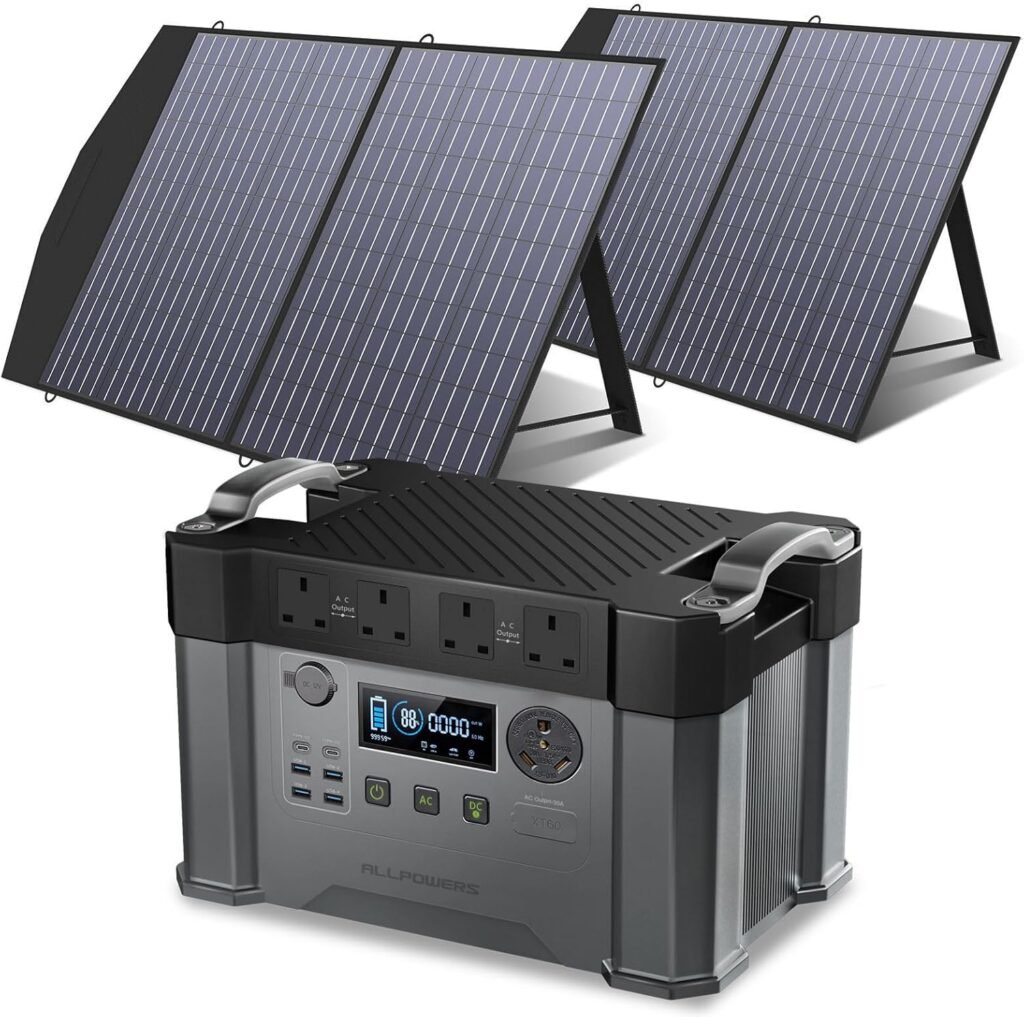Solar Panel Battery Backups: How to Add a Battery Backup to Your System
Just a heads up, this post contains some affiliate links. That means that we earn a small commission if you buy the product at no extra cost to you. That allows us to continue to research and share interesting articles with you. :)
If you live in an area that experiences frequent power outages or extreme weather conditions, adding a solar panel battery backup to your system can be a lifesaver.
A few years ago, we had a power cut that lasted well over 12 hours. Luckily, it was during the summer, so heating wasn’t an issue, and our stovetop is gas powered so we still had a way to cook easily, but we did have things to worry about.
We have a little pet corn snake (called Ginger Noodle!) and her vivarium needs to be kept around 30C; this was impossible during a power outage and meant using hot water bottles to try to help keep her warm.

Another issue we faced was that we have two freezers full of fresh food and preserved freezer meals. 12 hours during the height of summer would have meant we lost a lot. As luck would have it, this was at the beginning of summer, so we only lost a few bits right at the front of the freezer, but it was still a wake-up call to both get ourselves sorted with alternative energy options, as well as learn how to preserve food in other ways!
Since that experience, I’ve been exploring ways to ensure that my home has a reliable and uninterrupted power supply, and adding a solar panel battery backup is one of the best solutions I’m looking into.
If you are considering adding a solar panel battery backup to your system, you are on the right track to securing a reliable and uninterrupted power supply for your home or business. A solar panel battery backup can provide you with the peace of mind of knowing that you will still have access to electricity during power outages or emergencies.
In this article, we will discuss the benefits of having a solar panel battery backup and how to add one to your system.
Benefits of a Solar Panel Battery Backup
Adding a solar panel battery backup to your system has many benefits. Here are some of the advantages of having a solar panel battery backup:
Provides Backup Power During Outages
One of the main advantages of having a solar panel battery backup is that it provides backup power during outages. This means that even when the grid goes down, you will still have access to electricity.
Reduces Energy Costs

Adding a solar panel battery backup can help reduce your energy costs. During peak hours, when electricity is more expensive, you can use the power stored in your battery instead of buying electricity from the grid.
Increases Self-Sufficiency
Having a solar panel battery backup can increase your self-sufficiency. You will no longer be reliant on the grid for your power needs, which means you can generate and store your own energy.
Reduces Carbon Footprint
By generating and storing your own energy, you can reduce your carbon footprint. Solar energy is clean and renewable, which means it does not produce any greenhouse gas emissions.
Types of Solar Panel Battery Backup Systems
There are two types of solar panel battery backup systems: AC-coupled and DC-coupled.
AC-Coupled Solar Panel Battery Backup System
An AC-coupled solar panel battery backup system is connected to your home’s electrical system. It works by converting the DC power from your solar panels to AC power using an inverter, which is then used to power your home. The excess power generated and not immediately used by your home is then stored in the battery for later use.

When your solar panels generate more power than your home uses, the excess power is sent back to the grid. However, this excess power cannot be sent back to the grid during a power outage, as the grid is down. This is where the battery backup system comes into play. The battery stores the excess power and makes it available for your home to use during an outage.
An AC-coupled solar panel battery backup system is a good choice for homeowners with a grid-tied solar system and want to add a battery backup. It is also a good option for homeowners who live in areas with frequent power outages, as it provides a reliable backup power source.
One important thing to remember when choosing an AC-coupled solar panel battery backup system is that the inverter needs to handle both the solar panels and the battery. This means that you will need to choose an inverter with enough capacity to handle your peak power demand and the power generated by your solar panels and stored in the battery. Additionally, the inverter must be able to detect when the grid is down and switch to battery power automatically.
Overall, an AC-coupled solar panel battery backup system is a great way to ensure a reliable and uninterrupted power supply during outages and emergencies. It is an investment that can provide you with peace of mind knowing that you and your family can access electricity when you need it the most.
DC-Coupled Solar Panel Battery Backup System
A DC-coupled solar panel battery backup system is connected directly to your solar panels, bypassing your home’s electrical system. It works by storing the DC power generated by your solar panels in the battery for later use. When you need electricity, the battery converts the DC power back to AC power, which is then used to power your home.
The DC-coupled system is an efficient and cost-effective solution for homes with off-grid solar systems. In an off-grid system, the solar panels generate all the power needed to run the home, and any excess power is stored in the battery for later use. This system is ideal for remote locations where connecting to the grid is not possible or cost-effective.
The DC-coupled solar panel battery backup system is also a great option for homeowners who want to go completely off-grid. It is important to note that in a DC-coupled system, the battery needs to be sized to handle the entire electrical load of the home since it is directly connected to the solar panels.
One advantage of a DC-coupled system is that it is more efficient than an AC-coupled system since fewer energy conversions are needed. In an AC-coupled system, the DC power from the solar panels is first converted to AC power then back to DC power to charge the battery.
In a DC-coupled system, the DC power from the solar panels is directly stored in the battery, eliminating the need for the extra conversion step.
Overall, a DC-coupled solar panel battery backup system is a great option for homeowners who want to go off-grid or have an off-grid solar system. It is an efficient and cost-effective solution that can provide reliable backup power during outages and emergencies.

Portable Solar Power Stations
Another option for backup power is a portable solar power station. A portable solar power station is a compact and lightweight device that can power small appliances and devices. It consists of a solar panel and a battery that can be charged using solar energy.
Portable solar power stations are a good option for outdoor activities, such as camping or hiking, or for emergencies with limited access to electricity. They are also a great option for homeowners who want a backup power source but do not want to invest in a full-scale solar panel and battery backup system.
One advantage of a portable solar power station is its portability. It can be easily moved from one location to another and be used to power devices and appliances wherever you go.
Another advantage is its cost-effectiveness. Portable solar power stations are generally less expensive than full-scale solar panel battery backup systems, making them a great option for homeowners on a budget.
A third benefit is the range of sizes. Our favourite brand is Allpowers, they make well-priced and versatile power stations in a range of sizes, and we love that they have quick charging meaning that most power stations (even the big ones) can be charged to around 80% from a wall outlet in around 1-2 hours.
Options at both ends of the scale include:
- The Allpowers 200W Portable Power Station: This little battery bank is the perfect between when it comes to having a battery bank for your phone and a power station to run your laptop. This will keep most laptops going for around half of a charge (although the inverter may not be suitable for some high-powered gaming or video editing laptops). There is 1 AC adapter onboard and it also supports wireless charging, which is a huge bonus. The power bank and a folding 60w solar panel is priced at around £250.
- The Allpowers 300W Portable Power Station: This power station is perfect for camping trips, charging phones, and keeping most laptops going for a few charges. This small power station is priced around £240 (without solar panels).
- The Allpowers 700W 606Wh Portable Power Station: This is the perfect compromise when it comes to power and price, and it’s actually the one we are going to get in a few weeks’ time as of writing this so that Niki can work down at the allotment. The AC adapters and inverters are plenty to keep even a gaming (or video editing…) laptop going for a good few charges, and it’s small enough and light enough to be carried around easily. The price of this setup is around £540 without any solar panels.
- The Allpowers Portable Power Station S1500: This small and light 1500W inverter-enabled power station is portable and easy to carry. With 4 AC outlets, it’s perfect for camping, road trips, and short van-life adventures and will work well to power most medium appliances in a power cut. This power station is priced at around £1300 without solar panels.
- The Allpowers MPPT Solar Generator S2000 Pro: This 2400W 1500wh portable power station comes with 2x100w folding solar panels and is a great option for van-lifers, caravanners, campers, and those of us who want to have a versatile battery bank option that can power a large appliance like a fridge freezer during a long blackout. This whole kit will set you back around £2000 with the solar panels.
- The Allpowers R4000 Portable Home Battery: This large but portable power station packs a massive 21600Wh of battery life with a 4000W inverter. This beast will run practically any device in your home (including fridge freezers and power tools) for a good couple of days, and it’s perfect in a power-outage situation. A huge bonus is it can even be charged using an EV outlet, meaning charging on the go is simple. The downside is it comes in at around £2900 without solar panels.
However, it is important to remember that portable solar power stations have limited capacity, and most are only suitable for powering small appliances and devices. They are generally unsuitable for powering larger appliances, such as refrigerators or air conditioners (unless you pay out for the larger options). Additionally, they may not be able to provide enough power for extended periods, so choosing a model with sufficient capacity for your needs is important.
Overall, a portable solar power station is a great option for homeowners who want a backup power source that is portable and cost-effective. They are also a great option for outdoor activities and emergency situations with limited access to electricity.
Choosing the Right Solar Panel Battery Backup System
When choosing a solar panel battery backup system, there are a few things you need to consider:
- Battery Capacity: The battery capacity is the energy the battery can store. You must choose a battery with enough capacity to meet your energy needs.
- Inverter Capacity: The inverter capacity is the maximum amount of power the inverter can convert from DC to AC. You must choose an inverter with enough capacity to handle your peak power demand.
- Cost: The cost of a solar panel battery backup system can vary depending on the size of the system and the features it offers. You need to choose a system that fits within your budget.
Installing a Solar Panel Battery Backup System

Installing a solar panel battery backup system can be done in a few steps:
- Install the Battery: The first step is to install the battery. You need to choose a location for the battery that is safe and dry, with good ventilation. You will also need to connect the battery to the inverter.
- Connect the Inverter: The next step is to connect the inverter to your home’s electrical system. A qualified electrician should do this to ensure it is done safely and correctly.
- Connect the Solar Panels: The final step is to connect the solar panels to the inverter. A qualified electrician should also do this.
Maintaining a Solar Panel Battery Backup System
You will need to perform regular maintenance to ensure your solar panel battery backup system continues to operate efficiently. Here are some tips:
- Check the Battery Levels: You should regularly check the battery levels to ensure it is charged and ready to use when needed.
- Keep the Battery Clean: Ensure the battery is clean and debris-free. This will help it operate efficiently and last longer.
- Monitor the System: Monitor the system regularly to ensure it operates correctly. If you notice any issues, contact a qualified technician for assistance.
Related Questions
How long do solar panel batteries last?
Solar panel batteries typically last between 5 and 15 years, depending on the type and quality of the battery. Lithium-ion batteries can last around 15 years. They are usually the most expensive but can provide better returns in terms of monetary value.

How much does a solar panel battery backup system cost?
The cost of a solar panel battery backup system can vary widely depending on the size of the system and the features it offers. However, on average, a solar panel battery backup system can cost between £5,000 and upwards of £10,000.
Portable solar power stations like the Allpowers MPPT Solar Generator S2000 Proo Portable Power Station are much cheaper and offer flexibility to take your power with you, but it is limited when you face a prolonged power cut and will only keep a full-sized fridge freezer going for around 24 hours.
Can I install a solar panel battery backup system myself?
It depends on what kind of system you want. If you are looking for a simple backup portable solar power station type system, these are very plug-and-play and don’t require any expert installation.
You should hire a qualified professional to install your full off-grid home solar panel battery backup system to ensure it is done safely and correctly. In the UK, all electrical work must be signed off by a qualified electrician.
How much energy can a solar panel battery backup system store?
The amount of energy a solar panel battery backup system can store depends on the size of the battery. A typical battery can store between 5 and 20 kWh of energy.
It’s better to work out how much energy you need in battery backups and work backwards to see what size battery system you will need.
How long does it take to install a solar panel battery backup system?
The installation time for a solar panel battery backup system can vary depending on the size of the system and the complexity of the installation.
On average, it can take between 2 and 4 days to install a solar panel battery backup system. A portable solar power station can be set up in seconds!
Back To The Good Life is a participant in the Amazon Services LLC Associates Program, an affiliate advertising program designed to provide a means for sites to earn advertising fees by advertising and linking to Amazon.com. We also participate in other affiliate programs which compensate us for referring traffic.








